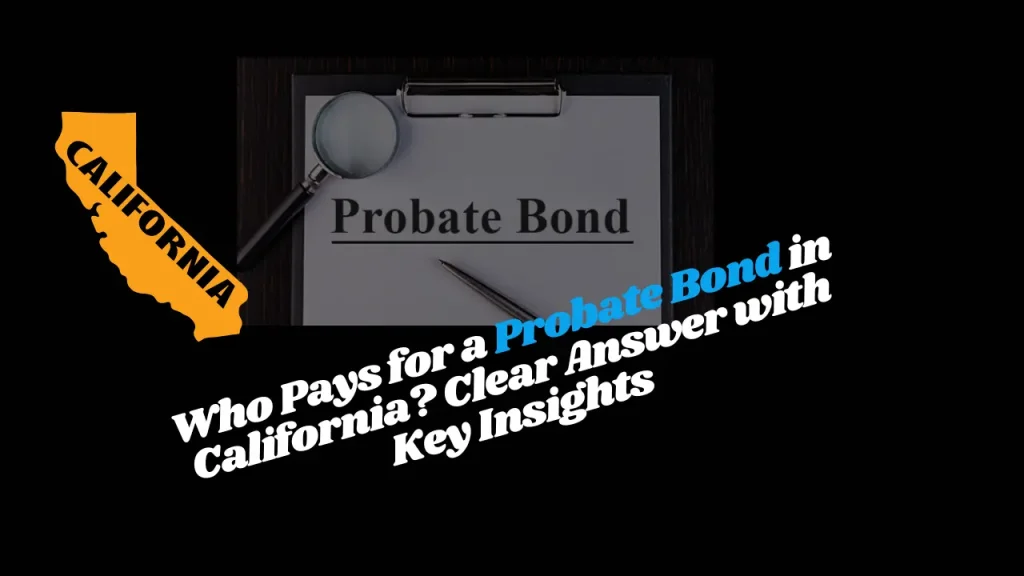Who Pays for a Probate Bond in California? Clear Answer with Key Insights
In California, the estate typically pays for the probate bond as an administrative expense. Executors may initially cover the cost, but they are reimbursed once estate assets are liquidated. However, certain exemptions apply, such as when a will waives the bond requirement or the estate qualifies for a simplified probate process. Here’s everything you need to know about probate bond costs, requirements, and exceptions in California.
Table of Contents
What Is a Probate Bond?
A probate bond (or fiduciary bond) acts as an insurance policy to protect the estate and its beneficiaries if the executor or administrator mismanages assets, commits fraud, or breaches their duties. The bond ensures financial recourse for losses caused by the executor’s errors or misconduct.
Who Pays for the Bond?
In California, the estate typically covers the cost of the probate bond as an administrative expense. Key points:
- California Probate Code § 8483: Explicitly classifies bond premiums as “expenses of administration,” paid from estate funds.
- Executor Reimbursement: While the executor may pay the bond premium upfront, they are reimbursed by the estate once assets are liquidated.
- Bond Amount: Set by the court, usually equal to the estate’s total value plus anticipated income. For example, if an estate is valued at $500,000, the required bond would typically be $500,000 as well.
When Is a Bond Required?
- Default Rule: Bonds are mandatory unless the will explicitly waives the requirement (Probate Code § 8480).
- Court Discretion: Even with a waiver, the court may demand a bond if heirs object or there are concerns about the executor’s reliability.
- Exemptions: Corporate executors (e.g., banks or trust companies) are often exempt from bonding requirements.
Related article for you:
How Long Does Probate Take in New Mexico? Updates for a Faster Process

Cost of a Probate Bond in California
- Premium Rates: Typically 0.5%–2% of the bond amount annually, depending on the executor’s creditworthiness and the surety company.
- Example: A
- 500,000bondat1
- 500,000bondat15,000/year, paid from estate funds.
- Factors Affecting Cost:
- Estate size.
- Executor’s credit score.
- Complexity of the estate.
Exceptions and Special Cases
- Will Waivers: If the will states “no bond required,” the executor is exempt (Probate Code § 8481).
- Small Estates: Estates under $184,500 (2024 threshold) may avoid probate entirely via simplified procedures, bypassing bond requirements.
- Family Agreements: Heirs can unanimously agree to waive the bond, even if the will is silent.
Steps to Obtain a Probate Bond
- Court Order: The court sets the bond amount during probate opening.
- Shop for Bonds: Compare quotes from licensed surety companies (e.g., SuretyBonds.com, Liberty Mutual).
- Submit Bond: File the bond with the court before Letters of Administration are issued.
What Happens If the Bond Is Insufficient?
If the executor’s actions deplete the bond (e.g., through fraud), the surety company covers losses up to the bond amount but may sue the executor to recover payouts.
Key Takeaways
- The estate pays for the bond unless the will waives it.
- Costs are reimbursable: Executors front the premium but are repaid from estate assets.
- Alternatives exist: Use a corporate executor or leverage small estate procedures to avoid bonding.
For personalized guidance, consult a California probate attorney or refer to the California Courts Probate Portal.
Need a Bond?
- Get free quotes: Surety Bonds Direct
- Legal help: California State Bar Lawyer Search
By understanding these rules, executors can manage probate confidently, ensuring compliance and protecting beneficiaries’ interests.
About the Author

Sarah Klein, JD, is an experienced estate planning attorney who has helped clients with wills, trusts, powers of attorney, and probate matters. At All About Lawyer, she simplifies complex estate laws so families can protect their assets, plan ahead, and avoid legal headaches during life’s most sensitive moments.
Read more about Sarah
